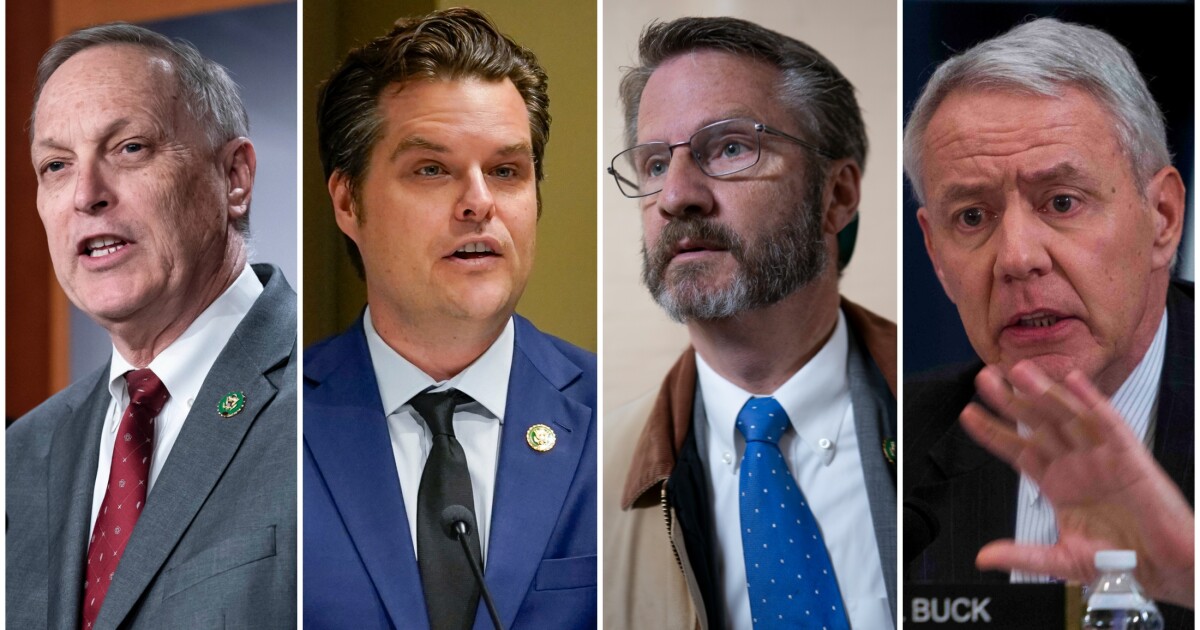

Four Republicans broke party lines on passage of the debt ceiling plan Wednesday, leaving House Speaker Kevin McCarthy (R-CA) without a vote to spare.
Although the measure appears to be a negotiating ploy for McCarthy’s deliberations with Democrats, as the plan is not likely to clear the Senate, the four Republicans largely cited concerns that McCarthy did not go far enough to claw back spending.
MCCARTHY MAKES LATE-NIGHT CONCESSIONS ON DEBT CEILING AMID GOP REVOLT
Given the GOP’s thin House majority, many naysayers questioned whether a debt limit agreement could even pass the lower chamber, but McCarthy proved them wrong. It cleared along party lines with a 217-215 vote.
Here are the four Republicans who broke ranks on the measure.
Matt Gaetz
Shortly after the GOP’s “Limit, Save, Grow” plan was first unveiled, Rep. Matt Gaetz (R-FL) threatened to vote against it if stronger work requirements for social safety net programs weren’t added to the legislation. He wanted its work requirements to take effect in fiscal 2024 rather than 2025.
Republicans ultimately made some of those changes during their 11th-hour tweaking of the bill. The timeline for Temporary Assistance for Needy Families (TANF) and the Supplemental Nutrition Assistance Program (SNAP) work requirements was bumped up to 2024.
Still, Gaetz was unsatisfied with the process and lack of spending rollbacks.
“As our nation is careening into a $32 trillion debt, Congress shouldn’t be making final changes at 2 a.m. — the morning of the vote — to legislation raising the debt limit $1.5 trillion,” he said in a statement. “A troubling fact remains. This plan will increase America’s debt by $16 trillion over the next ten years.”
“Gaslighting nearly $50 trillion in debt to America is something my conscious cannot abide at this time,” he added.
Tim Burchett
Despite the dramatic cuts in spending paired with the debt ceiling increase, Rep. Tim Burchett (R-TN) was not inclined to break his tradition of voting against debt limit hikes.
“I have never voted to raise our debt limit no matter who was in charge. Our country is nearly $32 trillion in debt right now. That’s a debt neither we, nor our kids or grandkids can pay. We need to do whatever is necessary to get back to a balanced budget and meaningful debt reduction so this issue doesn’t keep coming back to haunt us,” he said.
Ken Buck
During deliberations, Rep. Ken Buck (R-CO) largely kept his cards close to his chest, but when vote time came, he was a “no.” Buck explained that he was displeased with the measure’s lack of action at curbing government spending.
“Today, I voted no on the bill to raise the U.S. debt ceiling. While a step in the right direction, the Limit, Save, Grow Act does not do enough to rein in the federal government’s reckless spending. This bill will only reduce the projected deficit by $4.8 trillion dollars over the next ten years, leaving America with a $53 trillion debt during that time,” he said.
Andy Biggs
Rep. Andy Biggs (R-AZ) also voted against the measure, citing spending concerns. Earlier in the year, Biggs was one of the Republicans who voted against McCarthy for speaker during the final round. Some, such as Gaetz, voted “present” to allow McCarthy to go through.
“We owe the American people and our future generations sound and responsible fiscal policy. Increasing the national debt to ‘only’ $47 trillion over ten years — an increase of over $14 trillion from today — is misguided and perpetuates Washington’s spending problem,” he tweeted.
We owe the American people and our future generations sound and responsible fiscal policy.
Increasing the national debt to “only” $47 trillion over ten years – an increase of over $14 trillion from today – is misguided and perpetuates Washington’s spending problem. pic.twitter.com/aT3fs8i1sa
— Rep Andy Biggs (@RepAndyBiggsAZ) April 26, 2023
Amid a tumultuous process, McCarthy managed to win over holdouts with a slew of late-night concessions that spilled into Wednesday morning. The GOP plan to end the debt ceiling crisis would lift the nation’s borrowing authority over the next year either by $1.5 trillion or until March 31, 2024, whichever comes first.
CLICK HERE TO READ MORE FROM THE WASHINGTON EXAMINER
In exchange, the plan drastically curtails spending to 2022 levels and was initially projected to slash the national deficit by $4.8 trillion over the next 10 years, according to an estimate by the Congressional Budget Office. That estimate did not factor in the last-minute adjustments.
President Joe Biden has demanded a clean bill to increase the debt limit, despite McCarthy’s insistence it be paired with spending clawbacks. He has threatened to veto the proposal, and Democrats have unified in opposition. Even Senate Minority Leader Mitch McConnell (R-KY) has conceded it’s a nonstarter in the upper chamber.





